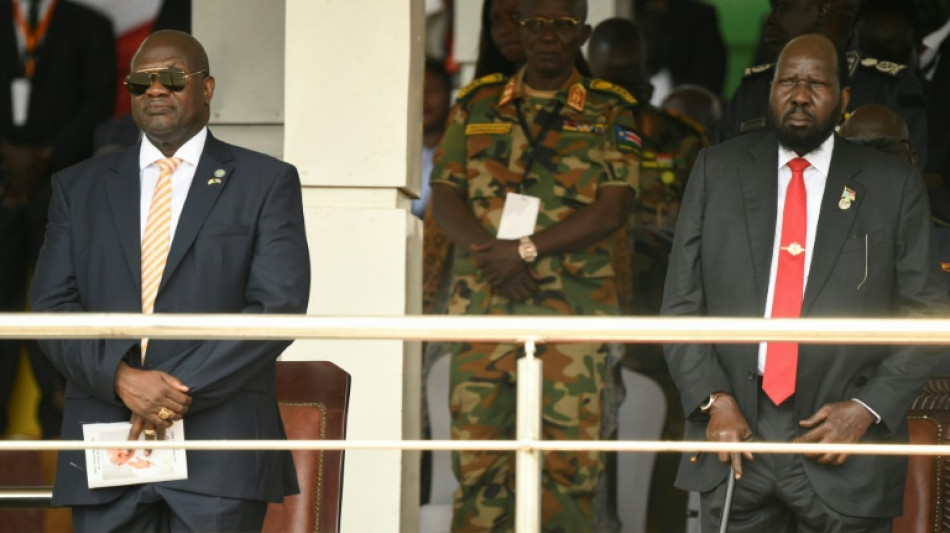
Arrest of vice president puts S.Sudan on brink of war

South Sudan's First Vice President Riek Machar, the long-time rival to President Salva Kiir, was arrested on Wednesday -- a move described by the UN as leaving the country on the brink of widespread conflict.
A convoy of 20 heavily armed vehicles entered Machar's residence in the capital Juba and arrested him, according to a statement issued by a member of his party, in a dramatic escalation of a conflict that has been building for weeks in the world's youngest country.
A power-sharing deal between Kiir and Machar has been gradually unravelling, threatening a return of the five-year civil war that killed around 400,000 people between 2013 and 2018.
"We strongly condemn the unconstitutional actions taken today by the Minister of Defense and the Chief of National Security, who, alongside more than 20 heavily armed vehicles, forcefully entered the residence of the First Vice President," said the statement, which was shared on Facebook by Reath Muoch Tang, his party's foreign relations committee chairman.
"His bodyguards were disarmed, and an arrest warrant was delivered to him under unclear charges. Attempts are currently being made to relocate him," it added.
The United Nations Mission in South Sudan (UNMISS) said Thursday the reported arrest left the country on a precipice.
"Tonight, the country's leaders stand on the brink of relapsing into widespread conflict," UNMISS head Nicholas Haysom said in a statement.
Breaches of the 2018 peace deal "will not only devastate South Sudan but also affect the entire region," he added.
South Sudan -- which declared independence from Sudan in 2011 -- has remained plagued by poverty and insecurity since the peace deal.
Analysts say an ageing Kiir, 73, has been seeking to ensure his succession and sideline Machar politically for months through cabinet reshuffles.
More than 20 of Machar's political and military allies in the unity government and army have also been arrested since February, many held incommunicado.
There have been violent clashes between forces loyal to the two rivals, most notably in the northeastern Nasir County of Upper Nile State.
Machar's party says a military base and two military training centres around Juba have been attacked by government forces since Monday.
A spokesman for Machar's military wing, the Sudan People's Liberation Army In Opposition (SPLA-IO), on Wednesday condemned the attacks as "terrorism" in a post on Facebook, and urged the international community to act.
The training centres were established to prepare opposition forces for integration into the unified army, a key provision of the 2018 peace agreement aimed at uniting government and opposition troops.
None of the incidents have been confirmed by the Kiir-aligned army, the South Sudan People's Defence Forces (SSPDF), though it accused Machar's forces of aggressive manoeuvres from one of the bases on Monday.
Many in Juba are unsettled by the latest clashes and political tensions.
"I am so worried about the situation. I feel like we are going back to war while we still need peace," Lilian Sukeji told AFP.
"Our leaders need to embrace dialogue rather than guns," she said.
- 'Red warning' -
Prior to Machar's arrest, Kiir said he reaffirmed his "unwavering commitment to restoring peace" following a meeting with church leaders.
But it follows weeks of violent clashes, particularly in Nasir County, where government forces loyal to the president have battled the so-called White Army, a militia with ties to Machar.
"The violence that started in March in Nasir seems to be spreading across a number of states in South Sudan," warned International Crisis Group's South Sudan senior analyst Daniel Akech.
He said the refusal of Kiir and Machar to engage in dialogue -- despite pressure from the international community -- was a "red warning".
If wider conflict did break out, he said, "it will be a very decentralised kind of violence, which would be very difficult to stop" as it could quickly escape the two leaders' control.
International observers have expressed increasing concerns, with Norway and Germany closing their embassies in Juba.
The British and US embassies in Juba announced they were reducing to minimal staffing, and urged citizens to leave the country.
burs-er/jhb
U.Neumann--BlnAP

 London
London

 Manchester
Manchester
 Glasgow
Glasgow
 Dublin
Dublin
 Belfast
Belfast
 Washington
Washington
 Denver
Denver
 Atlanta
Atlanta
 Dallas
Dallas
 Houston Texas
Houston Texas
 New Orleans
New Orleans
 El Paso
El Paso
 Phoenix
Phoenix
 Los Angeles
Los Angeles



